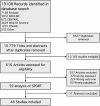Delayed Postoperative Radiotherapy in Head & Neck Cancers-A Systematic Review and Meta-Analysis
- PMID: 39744810
- PMCID: PMC11980969
- DOI: 10.1002/lary.31990
Delayed Postoperative Radiotherapy in Head & Neck Cancers-A Systematic Review and Meta-Analysis
Abstract
Objectives: To evaluate the impact of delayed postoperative radiotherapy (PORT) on overall survival (OS) in patients with head and neck cancers (HNC).
Data sources: A systematic review and meta-analysis were conducted by searching MEDLINE, Embase, CENTRAL, Web of Science, and CINAHL databases.
Review methods: Studies assessing the impact of delayed PORT in adult HNC patients were included. A total of 11,171 titles and abstracts were screened, with 52 studies meeting the inclusion criteria. Data were extracted, and a pooled random-effects analysis was performed. The primary outcome was overall survival (OS), comparing patients receiving timely PORT (within 42 days) to those with delays.
Results: Of the included studies, 31 were conducted in the United States, with 16 using the National Cancer Database (NCDB). Patients who did not receive PORT within 42 days had a 4% increase in mortality (adjusted Hazard Ratio [aHR]: 1.04 [1.03-1.06]; I2 = 78%; N = 254,189; 16 studies). Excluding time-overlapping NCDB-based studies, the OS benefit for timely treatment persisted (aHR: 1.10 [1.01-1.20]; I2 = 39%; N = 52,003; 5 studies).
Conclusions: Initiating PORT within 42 days is significantly associated with decreased mortality in HNC patients, reinforcing CoC recommendations. However, more research is needed to understand the relationship between different time cutoffs and outcomes, and to identify factors contributing to PORT delays. Future studies should explore the impact of treatment delays on patient-centered outcomes, such as Quality of Life (QoL).
Level of evidence: NA Laryngoscope, 135:1563-1570, 2025.
Keywords: head and neck cancer; postoperative radiotherapy; quality metric; squamous cell carcinoma; treatment delay.
© 2025 The Author(s). The Laryngoscope published by Wiley Periodicals LLC on behalf of The American Laryngological, Rhinological and Otological Society, Inc.
Figures



Similar articles
-
Delays Starting Postoperative Radiotherapy Among Head and Neck Cancer Patients: A Systematic Review and Meta-analysis.Otolaryngol Head Neck Surg. 2024 Feb;170(2):320-334. doi: 10.1002/ohn.538. Epub 2023 Sep 20. Otolaryngol Head Neck Surg. 2024. PMID: 37731255 Free PMC article.
-
Postoperative adjuvant chemotherapy in rectal cancer operated for cure.Cochrane Database Syst Rev. 2012 Mar 14;2012(3):CD004078. doi: 10.1002/14651858.CD004078.pub2. Cochrane Database Syst Rev. 2012. PMID: 22419291 Free PMC article.
-
Survival Associations of Timely Postoperative Radiotherapy Among Head and Neck Cancer High-Risk Subgroups.Laryngoscope. 2025 Aug;135(8):2783-2793. doi: 10.1002/lary.32074. Epub 2025 Feb 17. Laryngoscope. 2025. PMID: 39960154
-
Falls prevention interventions for community-dwelling older adults: systematic review and meta-analysis of benefits, harms, and patient values and preferences.Syst Rev. 2024 Nov 26;13(1):289. doi: 10.1186/s13643-024-02681-3. Syst Rev. 2024. PMID: 39593159 Free PMC article.
-
Hysterectomy with radiotherapy or chemotherapy or both for women with locally advanced cervical cancer.Cochrane Database Syst Rev. 2015 Apr 7;(4):CD010260. doi: 10.1002/14651858.CD010260.pub2. Cochrane Database Syst Rev. 2015. Update in: Cochrane Database Syst Rev. 2022 Aug 22;8:CD010260. doi: 10.1002/14651858.CD010260.pub3. PMID: 25847525 Updated.
References
-
- Coca‐Pelaz A, Takes RP, Hutcheson K, et al. Head and neck cancer: a review of the impact of treatment delay on outcome. Adv Ther. 2018;35(2):153‐160. - PubMed
-
- Ang KK, Trotti A, Brown BW, et al. Randomized trial addressing risk features and time factors of surgery plus radiotherapy in advanced head‐and‐neck cancer. Int J Radiat Oncol Biol Phys. 2001;51(3):571‐578. - PubMed
Publication types
MeSH terms
LinkOut - more resources
Full Text Sources
Medical
Research Materials

